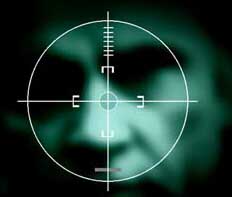U.S. is back in assassination business: George W. Bush secretly repealed a prohibition on assassinationSalt Lake TribuneFeb. 05, 2006 |
Popular 
'Woke' Google Fires 28 Employees Who Protested Gaza Genocide

Report: Blinken Sitting On Staff Recommendations to Sanction Israeli Military Units Linked to Killings or Rapes

America Last: House Bill Provides $26B for Israel, $61B for Ukraine and Zero to Secure U.S. Border

Bari Weiss' Free Speech Martyr Uri Berliner Wants FBI and Police to Spy on Pro-Palestine Activists

John Hagee Cheers Israel-Iran Battle as 'Gog and Magog War,' Will Lobby Congress Not to Deescalate
  Thirty-one years ago I worked for Sen. Frank Church of Idaho on the first U.S. Senate Intelligence Committee. What began as an analytic investigation of the U.S. intelligence community rapidly devolved into a much-televised investigation into the U.S. policy of attempting to assassinate foreign leaders. Thirty-one years ago I worked for Sen. Frank Church of Idaho on the first U.S. Senate Intelligence Committee. What began as an analytic investigation of the U.S. intelligence community rapidly devolved into a much-televised investigation into the U.S. policy of attempting to assassinate foreign leaders.Early in 1975, Vice President Nelson Rockefeller turned over to the committee the "family jewels"- a collection of notes from people within the U.S. Intelligence Committee that then-director of the Central Intelligence Agency, James Scheslinger, had gathered from CIA employees he had asked to chronicle the wrongdoings they had observed. The handoff from Rockefeller to Church began a two-year investigative process involving 142 staff members and 11 senators. In the end, more than 10 volumes of information were produced and various legislative and regulatory reforms were implemented. One of the most significant was a unanimous recommendation that the United States adopt a statute prohibiting political assassination. The Congress did not adopt the legislation. However, in 1977 after President Carter was sworn into office with Walter Mondale as his vice president, an executive order was issued prohibiting the use of political assassination. Mondale, a former member of the Church committee, implemented the policy in the new administration. Under Presidents Reagan, Bush "41" and Clinton, the executive order prohibiting political assassination was maintained and honored. As has now been publicly revealed, the administration of Bush "43" secretly repealed the prohibition on assassination. In its place, under the omnipresent 9/11 rationale, the U.S. is back in the business of assassination. If a poll of Americans were taken, most would acknowledge the perplexing problem of torture and other abuses chronicled in Iraq and Afghanistan. However, very few, if any, would be aware of the change in policy on assassination. The news media have covered the problem of torture, to an extent that most viewers and readers are numb to the news. However, the more fundamental and certainly irreparable problem of political assassination has not been raised, discussed or examined. It is almost as if the code of the news media being embedded with the U.S. forces is their implicit agreement not to cover or mention something like planned political killing. At a subconscious level, and perhaps even a conscious level, many of our neo-con policy formulators believe that if one "eliminates with extreme prejudice" (a CIA euphemism from the 1970s for assassination) one's international political opponents, victory is ours. Unfortunately, the illusion will result in several political activists being killed who are seen by their compatriots not as terrorists, but patriots. With their assassinations, the seed of hatred will be sown, only to blossom with future retaliatory assassinations. The U.S. Constitution's Fifth Amendment guaranteeing "due process" has had many challenges, yet it has survived 205 years. The 9/11 rationale is seductively attractive to address a grave, immediate threat. But, as the Church committee found 31 years ago, the use of assassination does not achieve the immediate objective of eliminating a political adversary, but sets off a long-term wave of recrimination that harms U.S. interests. No one really "wins" in the assassination game, and the whirlwind of repercussions has an unpredictable path of death and destruction. Put another way, the United States is bound in the future to feel the pain of assassination and the pang of guilt for the Bush administration's reformulation of the Church committee's effort to prohibit political assassination, just as many speculate President Kennedy's assassination was possibly the result of attempts by the CIA to assassinate Fidel Castro. At the end of the day, as individuals, as communities and as a nation we live and are judged by the practices we follow. How can we possibly be asking other nations to follow our lead if our conduct is to use political assassination as a policy? Some argue, "What if we had been able to assassinate Hitler, Tojo or Stalin, shouldn't we have done it?" Possibly, with the luxury of 20/20 hindsight, every effort should have been made to assassinate them when we were at war. In the context of today's "war," Osama bin Laden may fit into the Hitler category. But our assassination squads and our aerial drones are executing too many innocents ("collateral damage" in the Pentagon vernacular) for us to be convinced that the targets of these efforts are truly the linchpins to our successful prosecution of the war. Frankly, it is time to get back to serious, judiciously supervised law enforcement, both on a national and international scale, so we can once again assert that one of our distinct roles in the world is to demonstrate we truly are a society that values and respects life. --- Patrick Shea was assistant to the director of the U.S. Senate Intelligence Committee, 1975-76; counsel to the U.S. Senate Foreign Relations Committee, 1979-80; member of the Gore Commission on Aviation Safety and Security, 1996-97; and director of the Bureau of Land Management in the Clinton administration, 1997-1998. |



